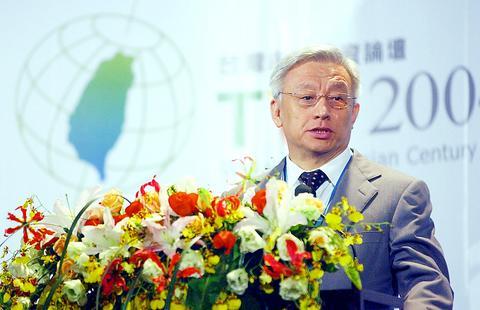United Microelectronics Corp (UMC, 聯電) Chairman Robert Tsao (曹興誠) yesterday criticized his bigger rival, Taiwan Semiconductor Manufacturing Co (TSMC, 台積電) Chairman Morris Chang (張忠謀), for the latter's recent change in attitude toward a stock bonus scheme.
In a speech delivered at the 2004 Taiwan Venture Forum yesterday, Tsao said the stock bonus scheme is a proven system that helps the nation's high-tech companies hold onto their employees.

PHOTO: CNA
But there are concerns by investors and regulators that excluding such grants as a cost allows companies to inflate their profits while hurting return on equity. Still, Tsao defended the scheme as the best solution to attain a lower employee turnover rate.
In late October, Chang said that the expenses incurred by stock bonuses do place a burden on earnings and could distort a company's bottom line. He said that TSMC was still seeking a better solution to retain talented employees and safeguard shareholders' interests.
As a result, TSMC said last week that its board was proposing a revised stock dividend policy, calling for future dividend distributions to be made preferably by way of cash.
Stock dividends won't exceed 50 percent of the total distribution, the company said in a statement.
But Tsao yesterday raised doubts about Chang's stewardship. He said that stock bonuses should be granted to rank-and-file employees instead of senior level management, but as far as he knew Chang received the majority of TSMC's dividend distribution.
"TSMC and Morris Chang are the biggest beneficiaries of the stock bonus scheme, and we believe that he should come out to defend the system. But he hasn't," Tsao said.
"After he [Chang] criticized the system ... we thought he might cancel the grants. But in contrast, he worked to issue the dividend, with himself receiving the greatest amount. Therefore, I question his credibility," Tsao said.
The new rules requiring firms to count stock bonuses as part of their costs, are expected to be implemented next year, a Chinese-language business daily reported last month, citing unidentified government officials.

GROWING OWINGS: While Luxembourg and China swapped the top three spots, the US continued to be the largest exposure for Taiwan for the 41st consecutive quarter The US remained the largest debtor nation to Taiwan’s banking sector for the 41st consecutive quarter at the end of September, after local banks’ exposure to the US market rose more than 2 percent from three months earlier, the central bank said. Exposure to the US increased to US$198.896 billion, up US$4.026 billion, or 2.07 percent, from US$194.87 billion in the previous quarter, data released by the central bank showed on Friday. Of the increase, about US$1.4 billion came from banks’ investments in securitized products and interbank loans in the US, while another US$2.6 billion stemmed from trust assets, including mutual funds,

AI TALENT: No financial details were released about the deal, in which top Groq executives, including its CEO, would join Nvidia to help advance the technology Nvidia Corp has agreed to a licensing deal with artificial intelligence (AI) start-up Groq, furthering its investments in companies connected to the AI boom and gaining the right to add a new type of technology to its products. The world’s largest publicly traded company has paid for the right to use Groq’s technology and is to integrate its chip design into future products. Some of the start-up’s executives are leaving to join Nvidia to help with that effort, the companies said. Groq would continue as an independent company with a new chief executive, it said on Wednesday in a post on its Web

JOINT EFFORTS: MediaTek would partner with Denso to develop custom chips to support the car-part specialist company’s driver-assist systems in an expanding market MediaTek Inc (聯發科), the world’s largest mobile phone chip designer, yesterday said it is working closely with Japan’s Denso Corp to build a custom automotive system-on-chip (SoC) solution tailored for advanced driver-assistance systems and cockpit systems, adding another customer to its new application-specific IC (ASIC) business. This effort merges Denso’s automotive-grade safety expertise and deep vehicle integration with MediaTek’s technologies cultivated through the development of Media- Tek’s Dimensity AX, leveraging efficient, high-performance SoCs and artificial intelligence (AI) capabilities to offer a scalable, production-ready platform for next-generation driver assistance, the company said in a statement yesterday. “Through this collaboration, we are bringing two

Even as the US is embarked on a bitter rivalry with China over the deployment of artificial intelligence (AI), Chinese technology is quietly making inroads into the US market. Despite considerable geopolitical tensions, Chinese open-source AI models are winning over a growing number of programmers and companies in the US. These are different from the closed generative AI models that have become household names — ChatGPT-maker OpenAI or Google’s Gemini — whose inner workings are fiercely protected. In contrast, “open” models offered by many Chinese rivals, from Alibaba (阿里巴巴) to DeepSeek (深度求索), allow programmers to customize parts of the software to suit their